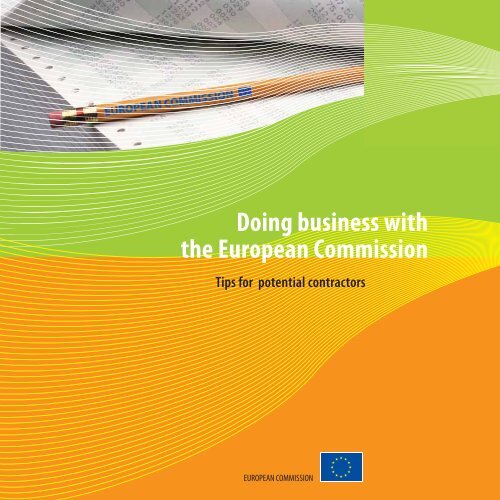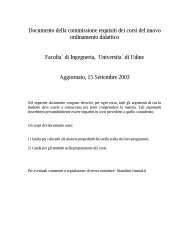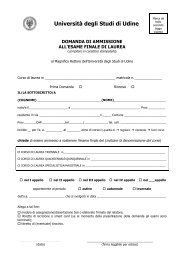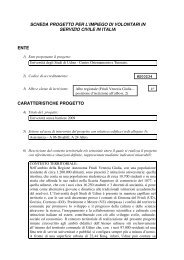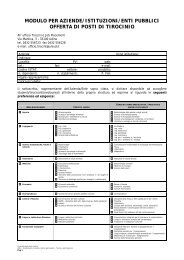Doing business with the European Commission (Tips for potential ...
Doing business with the European Commission (Tips for potential ...
Doing business with the European Commission (Tips for potential ...
Create successful ePaper yourself
Turn your PDF publications into a flip-book with our unique Google optimized e-Paper software.
<strong>Doing</strong> <strong>business</strong> <strong>with</strong><br />
<strong>the</strong> <strong>European</strong> <strong>Commission</strong><br />
<strong>Tips</strong> <strong>for</strong> <strong>potential</strong> contractors<br />
EUROPEAN COMMISSION
Text<br />
A <strong>business</strong><br />
opportunity<br />
<strong>for</strong> you<br />
C O N T E N T S<br />
<strong>Doing</strong> <strong>business</strong><br />
<strong>with</strong> <strong>the</strong> <strong>European</strong><br />
<strong>Commission</strong><br />
<strong>Tips</strong> <strong>for</strong> <strong>potential</strong> contractors<br />
Finding in<strong>for</strong>mation<br />
on contract opportunities . . . . . . . . . . . . . . . . . . . 3<br />
The ABC of procurement procedures . . . . . . . . . . 4<br />
The open procedure in detail . . . . . . . . . . . . . . . . 6<br />
Conditions <strong>for</strong> taking part<br />
in a procurement procedure . . . . . . . . . . . . . . . . . 8<br />
Your tender . . . . . . . . . . . . . . . . . . . . . . . . . . . . . . 10<br />
Do not let minor mistakes derail<br />
your tender! . . . . . . . . . . . . . . . . . . . . . . . . . . . . . . 12<br />
After signing <strong>the</strong> contract . . . . . . . . . . . . . . . . . . 13<br />
Appeals, complaints . . . . . . . . . . . . . . . . . . . . . . . 14<br />
Glossary . . . . . . . . . . . . . . . . . . . . . . . . . . . . . . . . . 15<br />
In 2007, <strong>the</strong> value of services<br />
and goods contracted<br />
by <strong>the</strong> <strong>Commission</strong> was<br />
EUR 2.86 billion.<br />
Title 01<br />
The <strong>European</strong> <strong>Commission</strong> is <strong>the</strong> executive arm of <strong>the</strong><br />
<strong>European</strong> Union: it administrates <strong>the</strong> EU budget and<br />
supervises <strong>the</strong> implementation of common policies.<br />
To carry out its tasks, <strong>the</strong> <strong>European</strong> <strong>Commission</strong> needs<br />
a wide array of goods and services, ranging from consultancy<br />
on policies and legislation, to courier services,<br />
office equipment and maintenance of premises. Some<br />
9 000 contracts are awarded each year through public<br />
procurement procedures. This may be a <strong>business</strong> opportunity<br />
<strong>for</strong> your company!<br />
Interested? This guide will help you get your bearings<br />
and tell you where to look <strong>for</strong> details.<br />
Services<br />
81 %<br />
Supply contracts<br />
12 %<br />
Works<br />
7 %
Finding in<strong>for</strong>mation<br />
on contract opportunities<br />
Tenders Electronic Daily (TED)<br />
Tenders Electronic Daily (TED) is <strong>the</strong> primary<br />
source of in<strong>for</strong>mation about big public procurement<br />
procedures organised by <strong>the</strong> <strong>European</strong> <strong>Commission</strong><br />
and o<strong>the</strong>r public authorities across <strong>the</strong> EU:<br />
http://ted.europa.eu/<br />
Extended search on TED<br />
Through TED, you can easily find what you are looking<br />
<strong>for</strong>: use <strong>the</strong> extended search option to search by<br />
country, common procurement vocabulary code (see<br />
Glossary), type of contracting authority, etc.<br />
<strong>Commission</strong>’s website<br />
Low-value contracts:<br />
services, goods and works worth less <strong>the</strong>n EUR 60 000.<br />
Low-value contracts are not usually advertised in TED.<br />
Those <strong>with</strong> a value between EUR 25 000 and 60 000<br />
may be found on <strong>the</strong> web pages of <strong>Commission</strong> departments<br />
intending to organise a procurement procedure.<br />
A directory of <strong>the</strong>se pages can be found at:<br />
http://ec.europa.eu/public_contracts/index_en.htm<br />
O<strong>the</strong>r opportunities<br />
Contracts smaller than EUR 25 000 are awarded<br />
through a negotiated procedure <strong>with</strong>out a previous<br />
publication. These opportunities are not advertised<br />
but, if you make yourself visible on <strong>the</strong> market, you<br />
may receive an invitation to submit an offer <strong>for</strong> such<br />
a contract.<br />
If you are interested in more in<strong>for</strong>mation on public procurement, go to<br />
http://europa.eu/publicprocurement/info/index_en.htm<br />
where you will find links to national public procurement databases, specific legislation, etc.<br />
3
The ABC of procurement procedures<br />
Here is a brief overview of <strong>the</strong> main procurement procedures.<br />
Open procedure<br />
Open procedure<br />
Restricted procedure<br />
Any economic operator interested can submit a tender.<br />
This is a one-step procedure. See pp. 6–7 <strong>for</strong> more details.<br />
abc<br />
Negotiated procedure<br />
The open procedure is by far <strong>the</strong> most<br />
commonly used and represents more than half<br />
of <strong>the</strong> contracts signed.<br />
Restricted procedure<br />
This is organised in two steps: <strong>the</strong> first step analyses<br />
<strong>the</strong> capacity of participants against <strong>the</strong> exclusion and<br />
selection criteria (see Conditions, p. 8): any interested<br />
economic operator can take part in this step; in <strong>the</strong><br />
second step those who passed <strong>the</strong> first step are invited<br />
to submit offers.<br />
Certain restricted procedures follow a call <strong>for</strong> expressions<br />
of interest (CEI). If you respond to such a call,<br />
you will have to prove your capacity against <strong>the</strong> exclusion<br />
and selection criteria announced (see Conditions,<br />
p. 8). If you pass, you will be put on a shortlist valid <strong>for</strong><br />
up to three years, which may be used many times <strong>for</strong><br />
4
different medium-value procurement procedures (generally<br />
service contracts up to EUR 133 000). Whenever<br />
a contract is to be awarded, <strong>the</strong> <strong>Commission</strong> invites<br />
short-listed candidates to submit a tender.<br />
Being short-listed after a call <strong>for</strong> expressions<br />
of interest means you may be invited to bid in<br />
restricted procedures <strong>for</strong> medium-value contracts.<br />
Negotiated procedure<br />
abc<br />
Examples of<br />
exceptional circumstances<br />
• lack of an acceptable offer in a<br />
previously advertised open or<br />
restricted procedure;<br />
• monopoly;<br />
• extreme urgency, e.g. in case of natural<br />
disasters, etc.<br />
Used <strong>for</strong> example when <strong>the</strong> value of <strong>the</strong> purchase is<br />
below EUR 60 000. The <strong>Commission</strong> invites economic<br />
operators directly to submit offers. If <strong>the</strong> <strong>Commission</strong><br />
considers that <strong>the</strong> offers can be improved, negotiations<br />
can be carried out on equal terms <strong>for</strong> all<br />
tenderers.<br />
abc<br />
The negotiated procedure <strong>for</strong> low-value contracts<br />
is usually simpler and faster than o<strong>the</strong>r procedures:<br />
you may be asked <strong>for</strong> fewer documents; <strong>the</strong><br />
requirements <strong>for</strong> candidates are less restrictive; <strong>the</strong><br />
tender documents, and in some cases <strong>the</strong> offers,<br />
may be sent by e-mail.<br />
Even <strong>for</strong> contracts above EUR 60 000, but only in exceptional<br />
circumstances, <strong>the</strong> <strong>European</strong> <strong>Commission</strong><br />
may negotiate <strong>the</strong> conditions of <strong>the</strong> contract, <strong>with</strong> one<br />
or several economic operators. The <strong>Commission</strong> may<br />
publish a contract notice in advance or simply consult<br />
economic operators of its choice.<br />
5
The open procedure in detail<br />
Optional step<br />
Pre-in<strong>for</strong>mation notice<br />
Official Journal ‘S’<br />
This notice announces plans <strong>for</strong> <strong>the</strong><br />
year ahead. It can be published in <strong>the</strong><br />
Official Journal ‘S’ series (OJ S) or on <strong>the</strong><br />
procurement website of <strong>the</strong> <strong>European</strong><br />
<strong>Commission</strong>.<br />
Contract notice<br />
and tender documents<br />
This notice gives all <strong>the</strong> basic in<strong>for</strong>mation<br />
you may need to decide whe<strong>the</strong>r you<br />
are interested in <strong>the</strong> contract, as well as<br />
<strong>the</strong> link where you can download <strong>the</strong><br />
tender documents.<br />
Tender documents generally consist of<br />
<strong>the</strong> invitation to tender, <strong>the</strong> specifications<br />
and <strong>the</strong> draft contract.<br />
http://ted.europa.eu<br />
All published contract notices<br />
are available in <strong>the</strong> TED<br />
(Tenders Electronic Daily) database at<br />
http://ted.europa.eu<br />
Documents<br />
In some cases, <strong>the</strong> tender documents<br />
are not available on <strong>the</strong> Internet<br />
and <strong>the</strong>y are sent by mail to all <strong>the</strong><br />
economic operators who requested<br />
<strong>the</strong>m at least five working days be<strong>for</strong>e<br />
<strong>the</strong> deadline <strong>for</strong> submission.<br />
Clarifications,<br />
answers to questions<br />
6
Corrigenda, changes<br />
to <strong>the</strong> tender conditions<br />
On-<strong>the</strong>-spot visit,<br />
in<strong>for</strong>mation session<br />
Even after you have downloaded <strong>the</strong> documents,<br />
do check regularly <strong>the</strong> page on which <strong>the</strong> tender<br />
documents were published <strong>for</strong> questions and<br />
answers and possible changes, such as an extension<br />
of <strong>the</strong> deadline.<br />
Receipt of tenders<br />
Tenders submitted after <strong>the</strong> deadline<br />
will not be accepted!<br />
Public opening<br />
The tenders are opened by<br />
<strong>the</strong> opening committee in public.<br />
Submission of missing<br />
documents or clarifications<br />
by tenderers<br />
You have <strong>the</strong> right to participate in <strong>the</strong> opening<br />
session and learn on <strong>the</strong> spot how many tenders were<br />
submitted and by whom.<br />
You may be asked <strong>for</strong> clarifications, confirmation<br />
of <strong>the</strong> corrections made in your offer or <strong>for</strong> missing<br />
documents. The <strong>Commission</strong> can only ask you to<br />
correct <strong>for</strong>mal mistakes. For example, if you <strong>for</strong>get to<br />
send your balance sheet, we can ask <strong>for</strong> it later, but if<br />
you <strong>for</strong>get to include <strong>the</strong> price in your tender, you will<br />
be excluded.<br />
Award of contract<br />
If your tender is finally selected, you will receive<br />
a letter <strong>with</strong> <strong>the</strong> contract to be signed and sent<br />
back to <strong>the</strong> <strong>Commission</strong>. The <strong>Commission</strong> may<br />
not sign <strong>the</strong> contract earlier than 14 days after<br />
<strong>the</strong> dispatch of <strong>the</strong> letters addressed to your<br />
competitors.<br />
If your tender is not successful, you will receive<br />
a letter in<strong>for</strong>ming you who won and why your tender<br />
was not chosen. You will have 14 calendar days to<br />
react if you think <strong>the</strong> rejection of your tender was not<br />
well justified.<br />
7
Conditions <strong>for</strong> taking part<br />
in a procurement procedure<br />
Legal <strong>for</strong>m and registration<br />
Legal <strong>for</strong>m and registration<br />
Participation is open to all economic operators registered<br />
in <strong>the</strong> EU and to all EU citizens. Participation<br />
is also open to any economic operator from a non-EU<br />
country which has an agreement <strong>with</strong> <strong>the</strong> EU about<br />
opening of public procurement markets.<br />
Exclusion criteria<br />
Selection criteria<br />
Language<br />
Partnerships<br />
Exclusion criteria<br />
To qualify to tender, economic operators must:<br />
• not be bankrupt;<br />
• not have been convicted of an offence concerning<br />
<strong>the</strong>ir professional conduct;<br />
• not have been guilty of grave professional misconduct;<br />
• have fulfilled <strong>the</strong>ir obligations <strong>for</strong> payment of taxes<br />
and social security contributions;<br />
• not have been convicted <strong>for</strong> fraud, corruption, involvement<br />
in a criminal organisation or any o<strong>the</strong>r<br />
illegal activity against <strong>the</strong> <strong>European</strong> Union’s financial<br />
interests;<br />
• not have been excluded from tendering due to a<br />
breach in a previous tender or contract.<br />
8
Selection criteria<br />
As a <strong>potential</strong> contractor, you must have <strong>the</strong> financial,<br />
economic, technical and professional capacity necessary<br />
to carry out <strong>the</strong> contract. You have to prove that<br />
you are financially sound, <strong>for</strong> instance by providing a<br />
statement of your enterprise’s overall turnover or liquidity.<br />
Your technical capability may be verified, <strong>for</strong><br />
example on <strong>the</strong> basis of previous projects or studies<br />
carried out in <strong>the</strong> relevant field.<br />
Language<br />
Tenderers are entitled to bid in any official language of<br />
<strong>the</strong> EU. Sometimes you may be additionally requested<br />
to submit a tender in a particular language (<strong>for</strong> example,<br />
in high technology tenders in which a certain<br />
language is predominantly used worldwide or when<br />
implementation of <strong>the</strong> contract depends on <strong>the</strong> knowledge<br />
of a certain language). When implementing <strong>the</strong><br />
contract, you will be obliged to work in <strong>the</strong> language<br />
required by <strong>the</strong> <strong>Commission</strong>.<br />
Partnerships<br />
• Consortia of economic operators: A joint tender may<br />
be submitted by a group of economic operators acting<br />
toge<strong>the</strong>r. However, your consortium may be required<br />
to adopt a given legal <strong>for</strong>m if your tender is<br />
selected.<br />
• Subcontracting: Tenderers may be requested to state<br />
<strong>the</strong> value of <strong>the</strong> contract that <strong>the</strong>y propose to subcontract<br />
and <strong>the</strong> identity of <strong>the</strong> subcontractor(s).<br />
9
Your tender<br />
There is no standard content of a tender. Precise in<strong>for</strong>mation<br />
is given in <strong>the</strong> tender documents. The content<br />
depends <strong>for</strong> example on <strong>the</strong> nature of <strong>the</strong> purchase, its<br />
value and <strong>the</strong> type of procedure. Here is a list of common<br />
requirements.<br />
Cover letter<br />
Legal entity<br />
Documents<br />
Declaration of honour<br />
Financial offer<br />
Technical offer<br />
Cover letter<br />
You may be asked to include a statement expressing<br />
acceptance of <strong>the</strong> technical specifications and <strong>the</strong><br />
model contract.<br />
Declaration of honour<br />
The tenderers must declare that <strong>the</strong>y are not guilty of<br />
doing any of <strong>the</strong> listed unprofessional or illegal behaviours<br />
that may exclude <strong>the</strong>m from <strong>the</strong> procurement<br />
procedure. The declaration must cover all consortium<br />
members and is often also required <strong>for</strong> <strong>the</strong><br />
subcontractors.<br />
Documents proving compliance<br />
<strong>with</strong> <strong>the</strong> selection criteria<br />
The criteria <strong>for</strong> assessing your financial capacity may<br />
refer to your turnover, liquidity or credibility, and may<br />
need to be documented, <strong>for</strong> example by your balance<br />
sheet, bank statement or insurance policy. Your professional<br />
capacity can be measured <strong>for</strong> example by asking<br />
10
you to list your experience in similar projects or your<br />
equipment or <strong>for</strong> CVs of your staff.<br />
Technical Proposal<br />
In <strong>the</strong> case of service contracts, your technical proposal<br />
will describe how you intend to implement <strong>the</strong> contract,<br />
in terms, <strong>for</strong> example, of method and time schedule. In<br />
<strong>the</strong> case of supply contracts, it will contain a specification<br />
of <strong>the</strong> goods to be delivered, though a description<br />
of <strong>the</strong> organisation of delivery is usually also needed.<br />
Price<br />
Depending on tender requirements, it may consist of<br />
a single global price or of a breakdown of prices. As a<br />
rule, prices have to be given in euro, excluding VAT<br />
or indicating VAT separately.<br />
Legal entity and bank account <strong>for</strong>ms<br />
(see: http://ec.europa.eu/budget/execution/legal_entities_en.htm)<br />
These <strong>for</strong>ms provide detailed in<strong>for</strong>mation to<br />
identify your company and are necessary be<strong>for</strong>e a<br />
contract can be signed <strong>with</strong> you <strong>for</strong> <strong>the</strong> first time.<br />
Documents requested <strong>for</strong> consortia<br />
or subcontractors<br />
The consortium leader may need to provide a power<br />
of attorney from <strong>the</strong> consortium members or a consortium<br />
agreement. You will be asked to present<br />
documents proving that <strong>the</strong> group will have at its<br />
disposal <strong>the</strong> necessary resources.<br />
O<strong>the</strong>r in<strong>for</strong>mation or documents<br />
may be required<br />
The <strong>Commission</strong> may require additional documents,<br />
<strong>for</strong> example related to <strong>the</strong> goods you are going<br />
to deliver (e.g. technical in<strong>for</strong>mation, warranty,<br />
certificates), documents proving that you are legally<br />
allowed to provide <strong>the</strong> services you are going to per<strong>for</strong>m<br />
(e.g. documents proving necessary education<br />
of <strong>the</strong> staff, such as engineering diplomas, licences<br />
and ownership of certain intellectual rights).
Do not let minor mistakes<br />
derail your tender!<br />
Staff<br />
Timing<br />
Deadlines<br />
Details<br />
Specifications<br />
Price<br />
Partnership<br />
Timing<br />
Do not wait until <strong>the</strong> last moment to prepare your<br />
tender and take time to check it! A slip-up may exclude<br />
you from <strong>the</strong> selection.<br />
If you have to submit <strong>the</strong> tender on <strong>the</strong> last day,<br />
remember that <strong>the</strong> <strong>European</strong> <strong>Commission</strong> mail office<br />
is open only during office hours. You can also send<br />
your tender by courier or registered mail,<br />
in which case it is <strong>the</strong> postmark that counts,<br />
not <strong>the</strong> date of receipt of <strong>the</strong> tender!<br />
Specifications<br />
If you do not understand <strong>the</strong> tender specifications,<br />
instead of guessing, ask <strong>the</strong> <strong>Commission</strong> <strong>for</strong> clarifications.<br />
Attention to detail<br />
Do not assume that small discrepancies may be accepted.<br />
They will not. In particular, if your tender<br />
does not fulfil <strong>the</strong> technical requirements of tender<br />
documents, it will not be accepted.<br />
12<br />
Partnerships<br />
Build a partnership if this is <strong>the</strong> way to fulfil <strong>the</strong> tender<br />
requirements.<br />
Price<br />
The award criteria will specify <strong>the</strong> relative importance<br />
of price and quality. It is usually better to tender<br />
<strong>the</strong> best possible quality, even if at a high price.<br />
Be realistic about staff<br />
Experts can be replaced only in exceptional circumstances<br />
and <strong>with</strong> experts having fully equivalent qualifications.<br />
If <strong>the</strong> experts you proposed in your tender<br />
decide not to work <strong>for</strong> you, you may encounter problems<br />
during implementation of <strong>the</strong> contract such as<br />
interruption of work, delays or financial penalties.<br />
Be realistic about deadlines<br />
If, after you sign <strong>the</strong> contract, you are unable to meet<br />
<strong>the</strong> time schedule you promised in your tender, you<br />
will have to pay liquidated damages <strong>for</strong> every day of<br />
delay.
After signing <strong>the</strong> contract<br />
Delivery<br />
• You have to deliver goods/services/works according to<br />
<strong>the</strong> technical specifications and to your own tender.<br />
• If your tender contains more than required by <strong>the</strong><br />
technical specifications, you have to deliver what<br />
you offered. But if your tender contradicts <strong>the</strong> specifications,<br />
<strong>the</strong> latter will apply.<br />
• Similarly, <strong>the</strong> contract prevails over <strong>the</strong> technical<br />
specifications and <strong>the</strong> tender.<br />
Reporting<br />
Remember that <strong>the</strong> contract<br />
concluded following a public<br />
procurement procedure<br />
cannot be subsequently<br />
modified. Changes are<br />
limited to administrative<br />
issues such as modification<br />
of <strong>the</strong> bank account, or to<br />
circumstances caused by<br />
external uncontrollable<br />
and un<strong>for</strong>eseen factors like<br />
natural disasters.<br />
Depending on <strong>the</strong> scale and subject of your contract,<br />
you may be required to present a report listing everything<br />
you have done including arrangements, timing,<br />
logistics and feedback you received.<br />
Payment<br />
The payment schedule is usually detailed in your contract.<br />
You will receive <strong>the</strong> payment under certain conditions:<br />
usually <strong>the</strong> submission of <strong>the</strong> report and <strong>the</strong><br />
invoice. The <strong>Commission</strong>, depending on <strong>the</strong> contract,<br />
will have 20, 45 or 60 days to evaluate your report and<br />
ano<strong>the</strong>r 30 days to make <strong>the</strong> payment. You may be<br />
asked <strong>for</strong> corrections or additional documents. In this<br />
case, <strong>the</strong> counting of days stops at <strong>the</strong> time of <strong>the</strong> request<br />
and restarts at <strong>the</strong> time you submit an answer. If<br />
an entirely new report has to be submitted, <strong>the</strong> counting<br />
restarts from zero.<br />
If <strong>the</strong> <strong>Commission</strong> does not pay you on time, you will<br />
be paid interest.<br />
A framework contract is a particular type of contract<br />
that establishes only <strong>the</strong> general outline of <strong>the</strong><br />
services or goods to be delivered. An additional<br />
step is required to make <strong>the</strong> actual purchase: <strong>the</strong><br />
<strong>Commission</strong> will place an order and, after receiving<br />
a satisfactory response, a specific contract will be<br />
signed. There<strong>for</strong>e, a framework contract does not<br />
imply a purchase in itself but is implemented<br />
through smaller specific contracts — every specific<br />
contract being signed, implemented, invoiced<br />
and paid separately.<br />
13
Appeals, complaints<br />
If you believe your tender has not been treated properly,<br />
or <strong>the</strong> tender conditions are discriminatory, you<br />
may complain to <strong>the</strong> responsible department <strong>with</strong>in<br />
<strong>the</strong> <strong>Commission</strong>.<br />
If you are not satisfied <strong>with</strong> <strong>the</strong> answer received, you<br />
can write to <strong>the</strong> <strong>European</strong> Ombudsman (http://www.<br />
ombudsman.europa.eu).<br />
You can also bring your complaint be<strong>for</strong>e <strong>the</strong> Court of<br />
Justice of <strong>the</strong> <strong>European</strong> Communities (http://curia.<br />
europa.eu). You must do this <strong>with</strong>in two months of <strong>the</strong><br />
decision which you are contesting.<br />
The Court of First Instance has jurisdiction to hear<br />
cases based on procurement procedures launched by<br />
<strong>the</strong> <strong>Commission</strong>.<br />
The <strong>European</strong> Ombudsman examines complaints of<br />
maladministration against EU institutions and bodies.<br />
A complaint must be made <strong>with</strong>in two years of<br />
<strong>the</strong> date when you got to know <strong>the</strong> facts on which<br />
your complaint is based and you must already have<br />
contacted <strong>the</strong> institution or body concerned, <strong>for</strong> example<br />
by letter.<br />
RESPONSIBLE<br />
DEPARTMENT<br />
EUROPEAN<br />
OMBUDSMAN<br />
COURT OF JUSTICE<br />
OF THE EUROPEAN<br />
COMMUNITIES<br />
14
Glossary<br />
Award criteria: The criteria used by <strong>the</strong> <strong>Commission</strong><br />
in awarding public contracts that may be ei<strong>the</strong>r<br />
price only (<strong>the</strong> lowest price) or, where <strong>the</strong> contract<br />
is awarded to <strong>the</strong> most economically advantageous<br />
tender, price and quality. Specific quality criteria<br />
are defined <strong>for</strong> each tender procedure. The relative<br />
weightings given to each of <strong>the</strong> criteria are given in<br />
<strong>the</strong> technical specifications.<br />
Common procurement vocabulary (CPV): The CPV<br />
establishes a single classification system <strong>for</strong> public<br />
procurement aimed at standardising <strong>the</strong> references<br />
used by contracting authorities to describe <strong>the</strong> subject<br />
of public contracts.<br />
Contract notice: Advertisement launching <strong>the</strong> procurement<br />
procedure published in <strong>the</strong> OJ S (to be<br />
found in TED).<br />
Economic operator: Any company or individual, natural<br />
or legal person, public entity or grouping that<br />
offers products, services or works on <strong>the</strong> market.<br />
Exclusion criteria: The criteria used by <strong>the</strong> <strong>Commission</strong><br />
to determine whe<strong>the</strong>r an operator should be excluded<br />
from <strong>the</strong> tendering procedure (see p. 10).<br />
Framework contract: A contract which sets <strong>the</strong> rules<br />
<strong>for</strong> a series of specific contracts (see p. 13).<br />
Pre-in<strong>for</strong>mation notice: Advertisement in <strong>the</strong> OJ S<br />
announcing <strong>the</strong> intention of launching <strong>the</strong> procurement<br />
procedure in <strong>the</strong> near future (to be found in<br />
TED).<br />
OJ S: The supplement <strong>for</strong> public procurement of <strong>the</strong><br />
Official Journal of <strong>the</strong> <strong>European</strong> Union (OJ).<br />
Selection criteria: The criteria used by <strong>the</strong> <strong>Commission</strong><br />
to determine whe<strong>the</strong>r an operator has <strong>the</strong> financial,<br />
economic, technical and professional capacity<br />
necessary to carry out <strong>the</strong> work (see p. 10).<br />
Specific contract: Contract specifying details of a particular<br />
task based on <strong>the</strong> previously signed framework<br />
contract (see p. 13).<br />
Technical specifications: Document describing <strong>the</strong><br />
subject of <strong>the</strong> procurement — what <strong>the</strong> <strong>Commission</strong><br />
wants to buy (part of <strong>the</strong> tender specifications).<br />
TED: Tenders Electronic Daily — online version of <strong>the</strong><br />
OJ S.<br />
Tenderer: An economic operator who has submitted a<br />
tender (offer).<br />
Tender specifications: Document or set of documents<br />
giving full details of <strong>the</strong> conditions, organisation<br />
and subject of <strong>the</strong> procurement procedure (includes<br />
technical specifications).<br />
15
Text<br />
For more in<strong>for</strong>mation on <strong>the</strong> EU budget and financial programming<br />
EU budget:<br />
http://ec.europa.eu/budget/index.htm<br />
(available in English, French and German)<br />
<strong>European</strong> <strong>Commission</strong> Directorate-General <strong>for</strong> Budget:<br />
http://ec.europa.eu/dgs/budget/index_en.htm<br />
For feedback on <strong>the</strong> brochure:<br />
budget@ec.europa.eu<br />
Title 01<br />
KV-81-08-537-EN-C<br />
This publication has been produced <strong>for</strong> in<strong>for</strong>mation purposes and <strong>the</strong> EU institutions<br />
cannot be held legally responsible <strong>for</strong> it.<br />
Europe Direct is a service to help you find answers to your questions about <strong>the</strong> <strong>European</strong> Union.<br />
Freephone number (*):<br />
00 800 6 7 8 9 10 11<br />
(*) Certain mobile telephone operators do not allow access to 00 800 numbers or <strong>the</strong>se calls may be billed.<br />
A great deal of additional in<strong>for</strong>mation on <strong>the</strong> <strong>European</strong> Union is available on <strong>the</strong> Internet.<br />
It can be accessed through <strong>the</strong> Europa server (http://europa.eu).<br />
Photo credits: Digital Vision/Getty Image, p. 12; <strong>European</strong> <strong>Commission</strong>, pp. 8, 14; Getty Image, cover;<br />
Medio Images, p. 13; Image100 Ltd, p. 5; PhotoAlto, p. 9; Photodisk/Getty Image, pp. 9, 11;<br />
Phovoir, pp. 6, 7, 11; Stockbyte/Getty Image, pp. 4, 10.<br />
© <strong>European</strong> Communities, 2009<br />
Luxembourg: Publications Office of <strong>the</strong> <strong>European</strong> Union, 2009<br />
2009 — 16 pp. — 21 x 21cm<br />
ISBN 978-92-79-13796-9<br />
doi:10.2761/22302<br />
Printed in Belgium<br />
PRINTED ON WHITE CHLORINE-FREE PAPER<br />
ISBN 978-92-79-13796-9<br />
16


